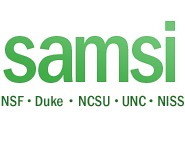2010 Summer Program on Semiparametric Bayesian Inference: Applications in Pharmacokinetics and Pharmacodynamics

Research Foci
Pharmacokinetics (PK) is the study of the time course of drug concentration resulting from a particular dosing regimen. PK is often studied in conjunction with pharmacodynamics (PD). PD explores what the drug does to the body, i.e., the relationship of drug concentrations and a resulting pharmcological effect. Pharmacogenetics (PGx) studies the genetic variation that determines differing response to drugs. Understanding the PK, PD and PGx of a drug is important for evaluating efficacy and determining how best to use such agents clinically.
Hierarchical models have allowed great progress in statistical inference in many application areas. Hierarchical models for PK and PD data that allow borrowing of strength across a patient population are known as population PK/PD models. These models have allowed investigators to learn about important sources of variation in drug absorption, disposition, metabolism, and excretion, allowing the researchers to begin to tailor drug therapy to individuals. Newer Bayesian non-parametric population models and semi-parametric models offer the promise of individualizing therapy and discovering subgroups among patients even further, by freeing modelers from restrictive assumptions about underlying distributions of key parameters across the population. The purpose of this program is to bring together a mix of experts in PK and PD modeling, non-parametric Bayesian inference, and computation.
The aims of the program and workshop are (i) to identify the critical new developments of inference methods for PK and PD data; (ii) to determine open challenges; and (iii) to establish inference for PK and PD as an important motivating application area of non-parametric Bayes. We believe that (iii) is particularly important for new and promising researchers.
The Program Leaders Committee is currently comprised of Gary Rosner and Peter Mueller (M.D. Anderson Cancer Center). A program committee of five area experts will oversee the scheduling of the first week workshop program.
Description of Activities
The program will begin with a week of tutorials and workshop activities. There will be extended, tutorial-style talks during morning sessions, and contributed and invited research talks during the afternoons. Afternoon talks will be selected to complement topics covered in the morning sessions.
At the end of the first week workshop research working groups will be formed. The working groups will tackle particular research problems in the area. Working group activities can include workshop-style presentations by group members to stimulate discussion on specific issues. Potential themes for these working groups and workshop sessions include
- semi-parametric population PK/PD models
- dose individualization
- probability models for PK/PGx networks
- joint inference for PK and PD data
